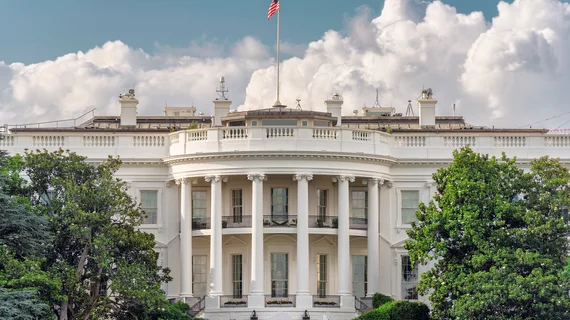Healthcare industry wins funding in coronavirus relief package
The healthcare industry got what it wanted, to an extent, with about $100 billion in funding allotted to providers in the Coronavirus Aid, Relief, and Economic Security Act (CARES Act).
The bill covers a $2 trillion relief package that includes a small one-time cash relief to most Americans, a boon in unemployment funding, billions in business loans, $500 billion in a corporate loan program, and more. Another $250 million is dedicated toward hospital preparedness. The healthcare industry previously urged Congress to ensure the bill would include funding to help providers respond to the crisis. The $100 billion will help providers respond, but there is also an accompanying emergency appropriations package that provides funding for lost revenues during the crisis.
The bill was approved by the Senate on March 25, in a 96-0 vote. It is expected to pass in the House and signed into law by President Trump, as well.
The American Hospital Association called the bill "an important first step" in dealing with the virus.
"This bill includes important provisions that will help us respond, including the creation of an emergency fund grant program, additional support for taking care of COVID-19 patients and relief from spending cuts, among other provisions," AHA President and CEO Rick Pollack said in a statement. "This support will help those hospitals from rural and urban communities that are in dire financial need due to this devastating pandemic. The AHA supports this legislation and urges the Senate and House to act quickly to pass it."
AMGA, a trade association with more than 175,000 physicians practicing across its member base, applauded the funding for healthcare providers as part of the CARES Act. Members of the organization have been following guidelines to best mitigate the disease, including halting elective surgeries and encouraging patients to stay home.
The membership is also ready to work with federal and local authorities to obtain necessary personal protective equipment to treat and care for COVID-19 patients.
“The first priority is patient care and safety, and that’s why this funding for PPE is so important,” AMGA President and CEO Jerry Penso, MD, MBA, said in a statement. “But the Senate also is acknowledging the incredible financial strain COVID-19 is creating for providers, who quickly recognized the need to change their practice patterns so they can fight the virus.”
The American Medical Association was also supportive of the funding dedicated to the healthcare industry.
“While we still must review the entire stimulus package, we appreciate that the legislation attempts to increase access to personal protective equipment for physicians and other health professionals on the front lines of care––though supply issues remain,” AMA President Patrice Harris, MD, MA, said in a statement. “The bill also provides needed financial relief to hard-hit workers, health systems and physician practices. At this critical moment, physician practices need significant financial support to sustain themselves and continue to meet the healthcare needs of all Americans during this time.”
The Association for Community Affiliated Plans (ACAP), which represents 74 not-for-profit Safety Net Health Plans that serve more than 20 million people, wrote to Congressional leaders March 25 about the CARES Act, asked for a handful of revisions to the final bill related to COVID-19 prevention, testing and treatment, as well as oversight of Medicaid managed care rate-setting.
ACAP also asked Congress to delay the new interoperability rules in its letter. The new rules, finalized by HHS and ONC earlier in March, are currently scheduled to begin implementation on Jan. 1, 2021.

